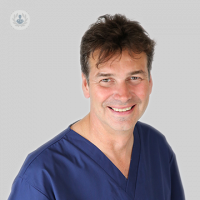What NOT to eat during pregnancy
Written in association with:Discovering that you’re pregnant is an exciting time, however, research into what happens next should include assessing your diet and nutritional needs.
What you eat plays a crucial role in a successful pregnancy as during this time your body needs additional nutrients and vitamins for both you and your growing bump. There are certain foods that should be avoided during pregnancy as they may increase the risk of harm to your baby or making you ill.
Here expert consultant obstetrician and gynaecologist Mr Keith Duncan shares which foods to avoid or limit to ensure a successful pregnancy.

What food groups should I avoid or limit during pregnancy?
The following food groups could be potentially harmful to you and your unborn baby:
- Refined carbohydrates – these are contained in foods such as white bread, white rice, chips, biscuits and many processed foods. Refined carbs elevate blood sugar levels, which can increase your chance of developing complications like pre-eclampsia and gestational diabetes and should be limited during pregnancy. Opt for whole grain.
- Unwashed fruit and vegetables – it is important to pay attention to washing your fruit and vegetables because they may carry harmful bacteria such as listeria. Raw bean sprouts such as alfalfa, clover and radish, are advised to be avoided for the same reason.
- Peanuts – avoid eating peanuts during pregnancy to decrease the chances of your baby developing an allergy to nuts.
- Harmful proteins – fish that contain high levels of mercury should be totally avoided during pregnancy such as shark, swordfish, white tuna and king mackerel. Fish containing lower levels of mercury such as canned tuna, salmon and pollock are okay to eat in moderation, which is no more than two average size meal portions a week.
Raw fish, including sushi, should be avoided as all fish needs to be cooked to ensure any bacteria are killed otherwise it could contain potentially harmless parasites.
Meat should be cooked very well and not eaten pink. Processed meats such as salami should be avoided as they may contain listeria. Eggs must be well cooked and not runny and you need to stay away from any sauces that contain raw egg, such as hollandaise or homemade mayonnaise. This reduces the chance of catching salmonella.
- Unpasteurised milk and juices – these can contain bacteria such as salmonella, E. coli and listeria. Any soft cheese made from unpasteurized milk, for example, feta, brie and blue cheese should be avoided. Hard cheese such as cheddar is safe to eat, as is cream and cottage cheese.
- Saturated fats – high-fat meats, whole milk, tropical oils such as coconut and palm, butter and lard are best avoided during pregnancy. These can raise cholesterol levels and potentially increase the risk of heart disease. Good fats to incorporate include those found in olives, avocados, nuts and flax seeds as they are crucial for healthy brain development of your baby.
- Refined sugar – found in soft drinks, sweets, chocolate, cakes and biscuits can elevate blood sugar levels. This increases the chance of developing pre-eclampsia, gestational diabetes and weight gain. Try a few squares of dark chocolate (70% plus) to curb any cravings for sugar.
- Salt – substitute salt with herbs and spices as food flavouring instead.
- Alcohol – the amount of alcohol that can be safely consumed during pregnancy is debatable. Many experts advise that you do not drink alcohol for the first trimester of pregnancy, and thereafter limit your intake to one or two units a week. Too much alcohol can permanently damage your developing baby’s cells.
- Caffeine – excess caffeine consumption slightly increases your risk of a miscarriage or a baby born with low birth weight. It is recommended that you do not have more than 200mg of caffeine in one day, which amounts to roughly two cups of tea or coffee.
Some soft drinks contain caffeine that needs to be factored into your daily allowance. Try sticking to water and herbal teas to stay hydrated although do read the labels on herbal teas first to check that they are safe to drink during pregnancy.
Do not hesitate to book an appointment with Mr Duncan if you would like advice during your pregnancy.


